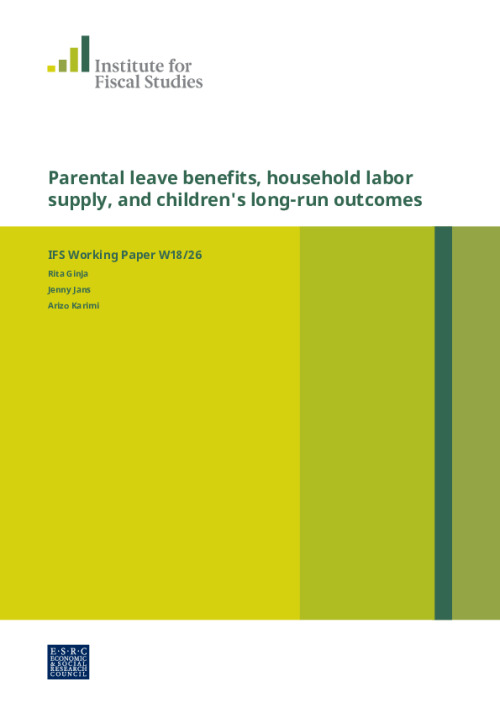Downloads

WP201826.pdf
PDF | 728.63 KB
We study how parental leave benefit levels affect household labor supply, family income, and child outcomes, exploiting the Speed Premium (SP) in the Swedish leave system. The SP grants mothers higher benefits for a subsequent child without re-establishing eligibility through market work, if two births occur within a pre-specified interval. We use the spacing eligibility cutoffs in a Regression Discontinuity framework and find that the SP improves educational outcomes of the older child, but not of the younger. Impacts are likely driven by increased maternal time and the quality of maternal time relative to the counterfactual mode of care.
Authors

Uppsala University

Research Associate University of Bergen
Rita is an IFS Research Associate, an Associate Professor at the University of Bergen and a Research Associate at the Uppsala University.

Jenny Jans
Working Paper details
- DOI
- 10.1920/wp.ifs.2018.2618
- Publisher
- The IFS
Suggested citation
R, Ginja and J, Jans and A, Karimi. (2018). Parental leave benefits, household labor supply, and children's long-run outcomes. London: The IFS. Available at: https://ifs.org.uk/publications/parental-leave-benefits-household-labor-supply-and-childrens-long-run-outcomes (accessed: 30 June 2024).
More from IFS
Understand this issue

Election Special: Your questions answered
27 June 2024

Election Special: The big issues politicians haven't spoken about
25 June 2024

Election Special: The Labour manifesto explained
14 June 2024
Policy analysis

How would the parties’ tax and spending plans affect Scotland and Wales?
28 June 2024

What are the parties’ plans for benefits and taxes?
24 June 2024

Plaid Cymru manifesto: a response
13 June 2024
Academic research

The intergenerational elasticity of earnings: Exploring the mechanisms
3 June 2024

Targeting men, women or both to reduce child marriage
28 May 2024

Keeping the peace whilst getting your way: Information, persuasion and intimate partner violence
17 May 2024